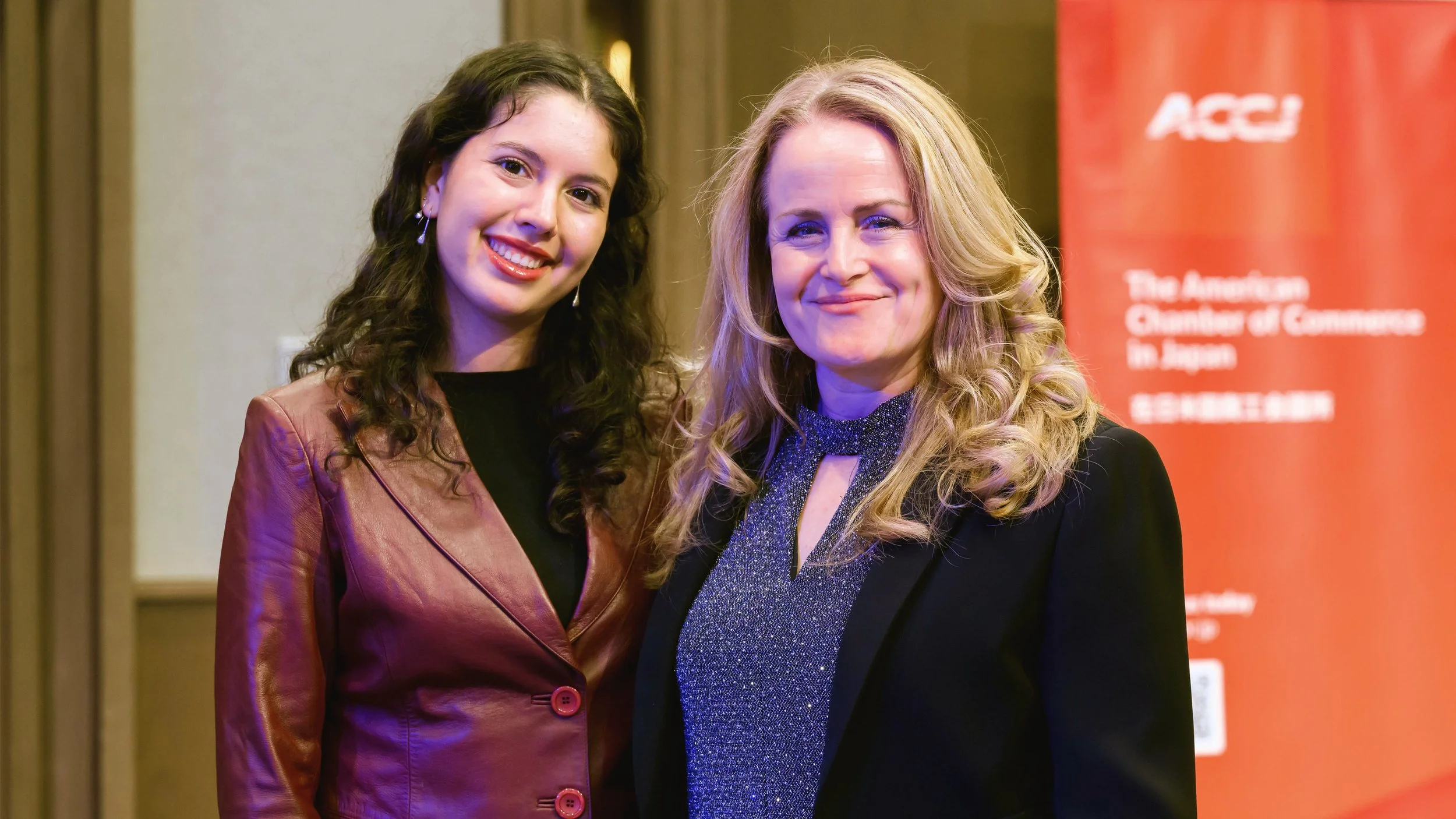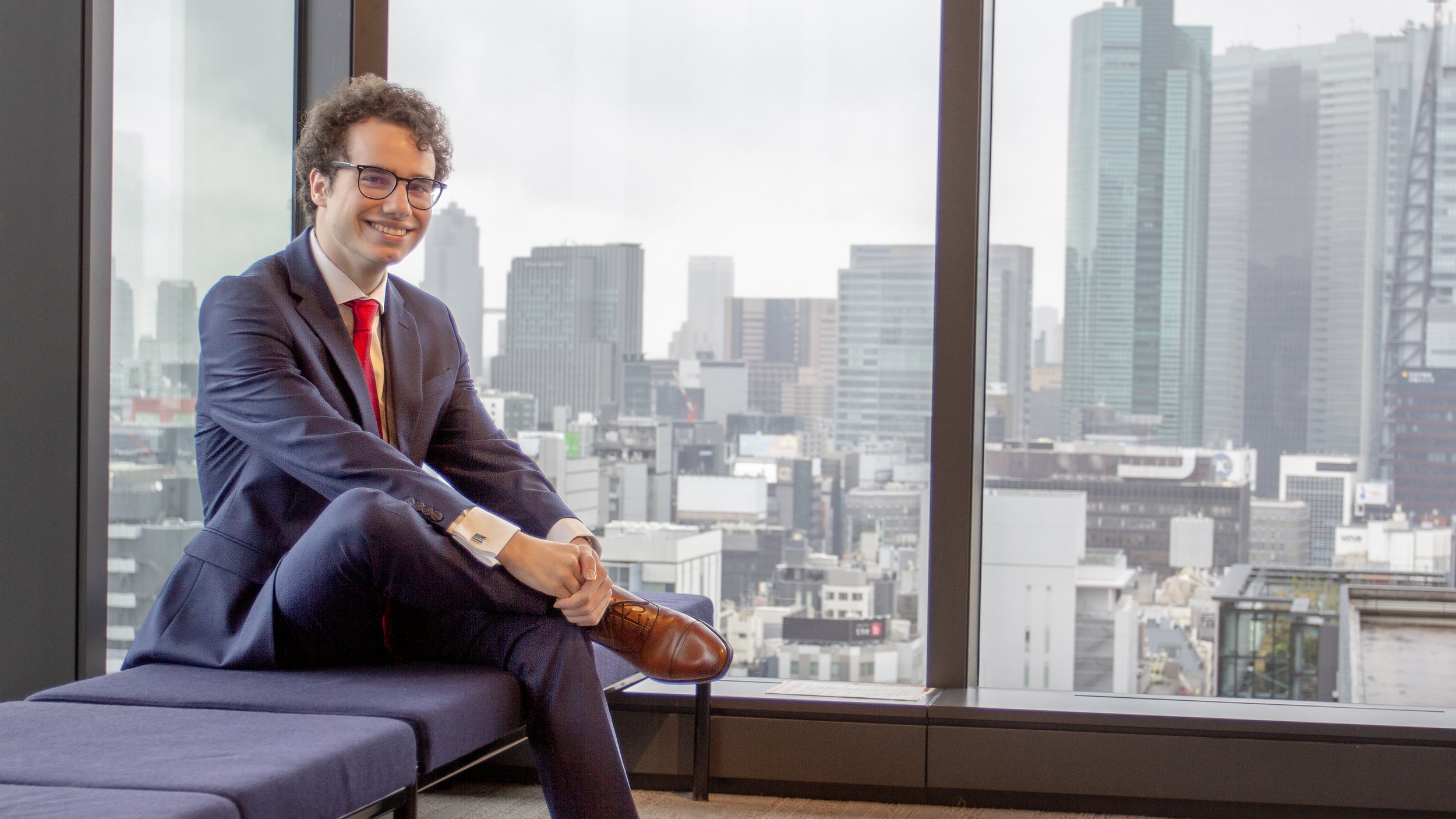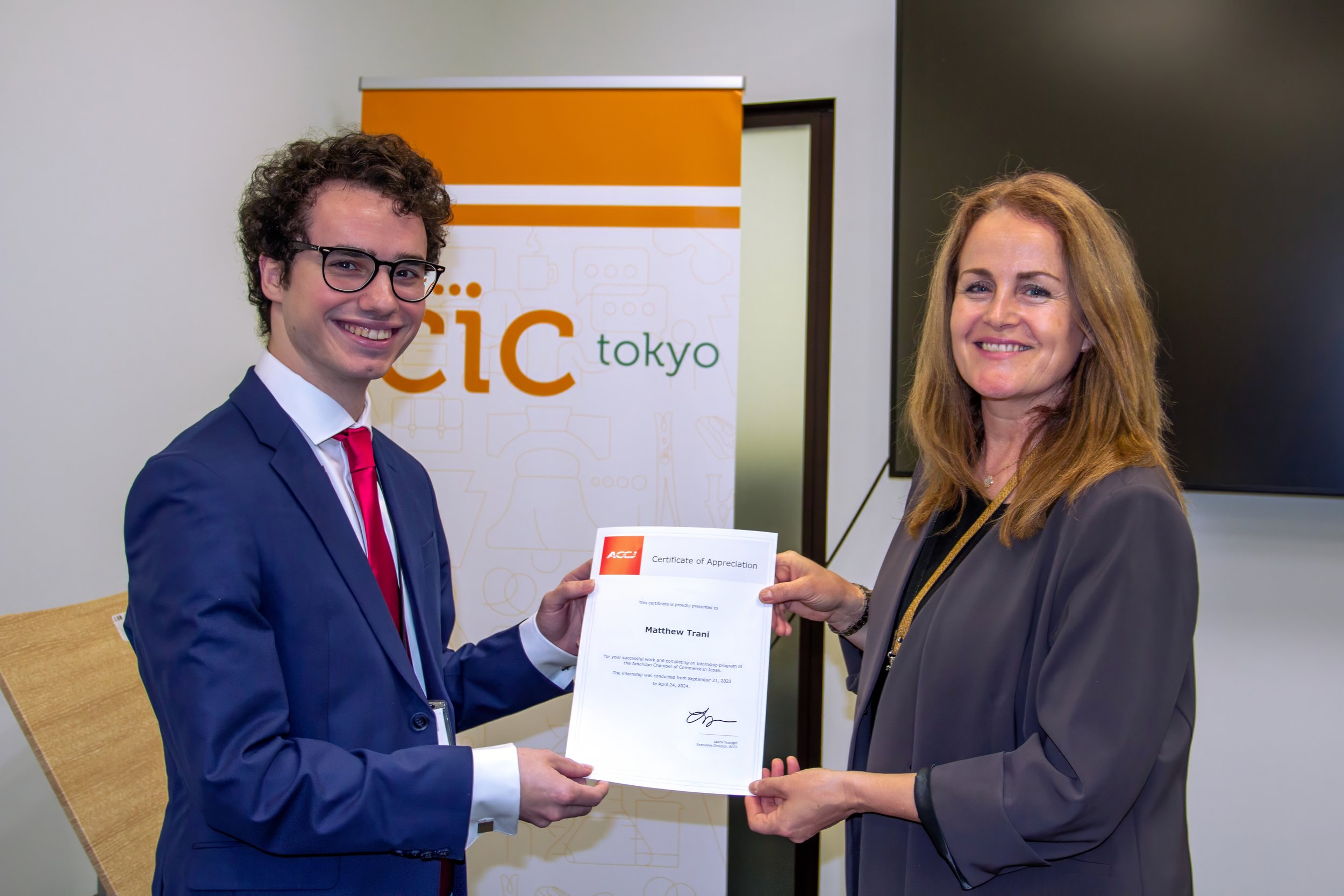Incredible Opportunity
Isabella Boulware shares her experiences interning at the ACCJ and how the Bishop Family Memorial Scholarship continues to open doors for young talent.
The Bishop Family Memorial Scholarship continues to open doors for young talent.
Photo Miki Kawaguchi/LIFE.14
From left: Isabella Boulware and ACCJ Executive Director Laura Younger
When Isabella Boulware logged on for a virtual meeting with the U.S.-Japan Bridging Foundation, she thought it was just a second-round interview for an internship. So when she was told she had been selected as the next American Chamber of Commerce in Japan (ACCJ) Bishop Memorial Scholar—a fellowship that honors late ACCJ leader Bill Bishop and his family—she was a bit surprised.
“I was thrilled,” said the Austin native. “I hadn’t planned on working during my time in Japan, but when I received an email about the opportunity, I knew I had to go for it.”
An international business management student at the University of Arkansas, Boulware, whose minors include Japanese, has been on a yearlong exchange at Toyo University in Tokyo since September. She spoke to The ACCJ Journal about her experiences at the chamber so far.
What was your first impression of the ACCJ?
Very positive. I researched the chamber when I first learned about the internship. As someone from the United States with an interest in working in Japan, the ACCJ’s mission immediately stood out to me. The team I’ve worked with, the professionals I’ve connected with, the events I’ve helped put together, and the projects I’ve contributed to have all made the experience incredibly impactful.
In which areas have you been most involved?
I’ve had the chance to take on a wide range of projects, which has been one of my favorite parts of working with the chamber. I’m still exploring where I want to focus in business, and the ACCJ has given me the opportunity to explore different aspects of the field. That’s helped me get a clearer sense of what I’m aiming for.
What has been your favorite event?
My first event was both my favorite and the one that left the biggest impression. It was on my first official day and was my introduction to the ACCJ. It was Building the Future of The Estée Lauder Companies in Japan, delivered by President and General Manager James Aquilina. I was impressed by the quality of the presentation and his effectiveness as a speaker. That event gave me a clear picture of the kind of professional I hope to be in the future.
How will you maintain your relationships?
I believe the relationships I’ve built at the ACCJ will continue to be an important part of my professional life. I plan to stay in touch with the people I’ve met, both personally and professionally. My coworkers, in particular, have become some of my good friends. Professionally, I will maintain connections through LinkedIn, email, and ongoing collaboration, ensuring that the relationships I’ve formed continue to grow.
What would you tell future Bishop Scholars?
This internship is an incredible opportunity. Make the most of each and every part of it. The ACCJ gives you a chance to work on a variety of projects and to meet people from across many industries. Build relationships during your time with the chamber; these are people who may be able to support you as you pursue your future.
Meaningful Mentors
Heather Kodhelaj and Leo Abufadil share how being chosen as Bishop Scholars has opened doors to their future careers.
Heather Kodhelaj and Leo Abufadil share how being chosen as Bishop Scholars has opened doors to their future careers.
From left: Leo Abufadil, ACCJ Executive Director Laura Younger, and Heather Kodhelaj at the 2025 ACCJ Shinnenkai
In her final year of high school, Heather Kodhelaj’s philosophy teacher suggested that she go into the foreign service. “I didn’t see a clear path, but my mom encouraged me to start traveling.”
Though Kodhelaj was born and raised in the United States, her parents are Albanian and immigrated in 1998. On her mother’s advice, Kodhelaj went to Europe. When she returned to Philadelphia, she caught herself falling into a rut and headed to South Korea for more international experience.
“When I came back from Korea, I was changed as a person and had fallen in love with Asia,” she explained. “My mom and I bonded over her love of a Korean drama called Crash Landing on You. It’s about a North Korean and a South Korean who fall in love despite their different cultures. Having been raised under Communism, she really identifies with the story.”
Seeing how time abroad was shaping Kodhelaj, her mother encouraged her to keep going. “When I heard about the Bishop Scholarship, she said, ‘Take a chance, the worst they can say is no.’”
Kodhelaj arrived at the American Chamber of Commerce in Japan (ACCJ) on August 22, 2024, for a five-month internship provided by the scholarship established after ACCJ leader Bill Bishop, his wife, and daughter were killed on Christmas morning in 2022. The award, established by the ACCJ and the US-Japan Bridging Foundation, brings students from the United States to study at Temple University, Japan Campus, where Bishop was a lecturer and board member.
The experience, Kodhelaj said, opened her eyes and changed the impression she had of Japanese business culture. Working on the ACCJ–Kansai D&I Summit was especially meaningful.
“The collage of 10 years of their events, seeing how everyone was so happy, talking, interacting, not a phone in sight—it was just genuine human connection. That they had done this for a decade, even through Covid … the perseverance of people was really inspiring,” she said.
Kodhelaj was also inspired by the her interactions with the Women in Business Forum, which she credits with teaching her to be more confident.
“I struggle with impostor syndrome. At the first event I helped with, I asked the executive who was speaking how to get over that feeling that you don’t belong in a room, that you’re not supposed to be there,” she recalls.
“I learned that, at the ACCJ, it’s not about your title or how much money you make, it’s what knowledge you bring to the table. And you don’t always have to have something valuable to say; listening to others is valuable as well. Now I understand that everyone belongs in the room, you always belong.”
Kodhelaj said she is grateful for the experience, the chamber, and Bishop. “I wish I could have met him. I learned that his daughter had also been an intern. That was very emotional for me. I could feel how important my role was, what it means to be an intern at the ACCJ.”
Following her internship, Kodhelaj has returned to Temple University in Philadelphia for her final semester studying global relations.
Leo Tanaka Abufadil already had ties to Japan before arriving on January 14 as a Bishop Scholar. His mother is Japanese and he attended elementary school in Amagasaki, Hyogo Prefecture, during summers despite growing up in Oklahoma.
Now a political science and international studies major at Trinity University in San Antonio, Texas, the Tulsa native said he is “fixated on the bilateral relationship between Japan and the United States.”
To pursue that interest, he applied for the US-Japan Bridging Foundation Scholarship, which he received, and the foundation then said they had another opportunity they felt he would be right for. “I was honestly very moved by the memory of Bill Bishop,” Abufadil said.
“As a Japanese American, the Bishop family’s passion for cultivating the bilateral relationship resonated with me. My goal as an intern was to propel that relationship while honoring the Bishop family’s legacy.”
Coming in, Abufadil explained, he had an idea of what the ACCJ might be like. He expected to work with economics and trade relations while improving his formal Japanese, known as keigo.
“But it’s been so much more than that,” he said. “Not only have I been able to sharpen my keigo, I gained a new perspective on how businesses operate in Japan. Something that was really illuminating and captivating is how intertwined business and government are. Being able to sit in on a lot of external affairs meetings, I could see the direct impact US and Japanese domestic and international policies each have on the other country. I find that quite fascinating.”
Abufadil said he especially loved that his time at the ACCJ wasn’t limited to one department or one activity. “There were a myriad opportunities. It was wonderful.”
The project he said he’s most proud of is the Student Internship Portal. “To see how the other interns and I, as well as our supervisors, worked so hard on this project, and to watch it take off, feels so rewarding. I love that I was able to make a tangible impact.”
He also recalls an unexpected moment with a member of a Japanese ministry.
“He was willing to talk to me and break down financial technology—something I had never engaged with in my life. People’s willingness to explain things and put them into perspective has been amazing. It’s something I’ll take with me for the rest of my life.”
A Bishop Scholar’s Journey
As his time as the first Bishop Memorial Scholar draws to a close, we sit down with Matthew Trani to learn about the experience and how he hopes to maintain his ACCJ connections.
As his internship ends, Matthew Trani shares impressions of the ACCJ and a message for future recipients.
Following the tragic deaths of Bill Bishop, his wife Izumi, and their daughter Sophianna on Christmas morning 2022, the American Chamber of Commerce in Japan (ACCJ) and the United States–Japan Bridging Foundation came together to honor their legacy. Launched in July 2023, the Bishop Family Memorial Scholarship Fund brings US students to Temple University, Japan Campus, where Bishop was a lecturer and board member. It also provides an internship at the chamber.
The ACCJ Journal interviewed the first recipient, Matthew Trani, last December, two months into his internship. As his time as a Bishop Memorial Scholar draws to a close, we again sat down with Trani to learn about the experience and how he hopes to maintain his ACCJ connections.
How do you feel about your internship ending?
Odd, because it almost feels like I’m leaving the community that I’ve been attached to—almost to a point of dependency—for the past eight months. There aren’t many places where you can have a working relationship and be able to just casually talk to people in Japan as a foreigner. That feeling hasn’t changed since our first interview.
How will you maintain your ACCJ relationships after you leave?
A lot depends on if I can convince my new company to become a member. If that were to happen, then I would potentially be back within a relatively short time.
But I think I can still connect regardless, as I’ve met as many members outside the chamber as I have through the chamber; they’re all in the same circles. When I get invited to somebody’s house, there will be a professor from Temple there, or someone from Tokyo American Club or the embassy. The network is so tight that they’re never more than one connection away.
Did making connections remain your number one goal?
A little bit. The priority did change from the beginning of the year. Making connections was great, but I needed a job to continue living here. A lot of the companies to which I was thinking of applying are ACCJ members, but I needed to figure things out on my own, which I did. The biggest difficulty is switching from a student visa to a work visa. I was very lucky to find a company that had the patience to do that.
Now, it should be a lot easier to use those connections in the future. So, I would say my goal didn’t change, but now that I’ve achieved my secondary goal, I can go back to my primary goal, which is to continue making and maintaining connections.
Beyond connections, what did you gain most from this experience?
I probably wouldn’t have had the chance to work in a corporate environment where I interacted with so many executives all at once. It’s kind of [remarkable] seeing somebody where it’s like, “Oh, you’re the CEO of Bloomberg Japan, which is the same company my dad works for in New York.” But this is someone that my dad would not usually be able to talk to. And it’s very different having Victor Osumi, as the president of Delta in Japan, saying hi to you and being on a first name basis.
Matthew Trani with ACCJ Executive Director Laura Younger
Where were you most involved at the ACCJ?
That changed over the course of the year. When I started, I was going to a lot of events and getting most of my networking connections early on. Then it shifted to more back-office work, and I worked a lot in Membership and we did some assignments on the competitive advantage of the ACCJ. That project took time to flesh out and get it to how we wanted it for the board.
On the whole, I definitely preferred the administrative work, with the exception of spreadsheets. I think with networking and helping at events it becomes much of the same routine, but when you deal with administrative materials, you can think a lot more critically. I really like jobs in which you can think deeply and try to solve problems.
What was your favorite event?
I learned so much from attending committee meetings. Often, I would think, “I didn’t know that, but that’s very interesting.” Or they would discuss things I’ve noticed in Japan but didn’t have the opportunity to say out loud.
We were at a meeting of the Tourism and Hospitality Committee and they were talking about how Japanese people aren’t going abroad, so domestic airlines are empty. Typically, it’s Japanese people who take those airlines, while foreigners take airlines from their home country.
It’s really crazy that a lot of the time you don’t have the opportunity to voice things like that, but the committees do so and work toward resolving those issues through advocacy papers and other things.
What would you tell future Bishop Scholars?
This is the best opportunity in Japan for a college student, one you never imagined you’d get. That’s what it was for me; I never expected that I would have the opportunity to do this during my time in Japan, and I never planned around it when I originally booked my study abroad. You can’t plan on where you’re going. I would say to all the Bishop Scholars who come after me, I’m sure you probably feel the same, so just roll with it and see where this opportunity takes you.
Trani completed his internship with the ACCJ in late April and is expected to begin working in Japan in mid-June, after having graduated from Hofstra University in late May.




